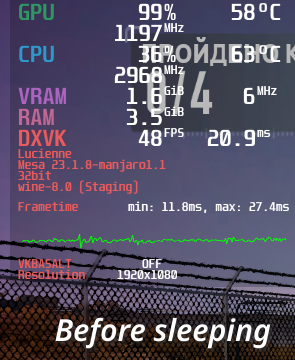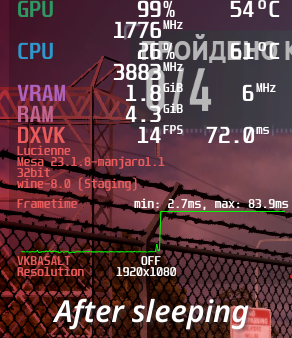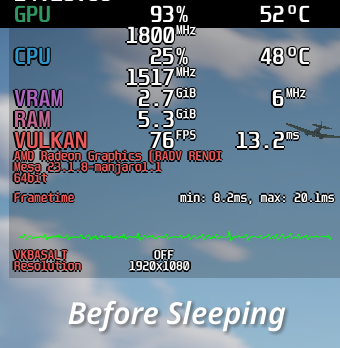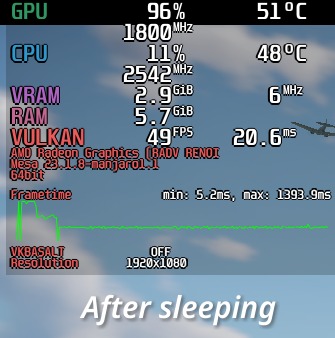Hello there! 3 or 4 month ago I encountered a loss of GPU performance after sleeping. I thought that updates will fix it but after waiting for a while I decided to fix it myself. Unfortunately, I am not good at Linux, the only thing I could do was change several kernels and change the driver for the GPU. I installed kernels 5.15-lts, 6.1-lts, 6.5, zen-kernel and xanmod and then installed AMD proprietary driver but I got the same gpu performance after sleep.
There is the sudo inxi --admin --verbosity=7 --filter --no-host --width output:
Kernel: 6.4.12-zen2-xanmod1-1 arch: x86_64 bits: 64 compiler: gcc v: 13.2.1
clocksource: hpet available: acpi_pm
parameters: BOOT_IMAGE=/@/boot/vmlinuz-linux-xanmod
root=UUID=9f520fb1-282a-4902-bd89-70d8d2fef54b rw rootflags=subvol=@ quiet
udev.log_priority=3 zram.num_devices=1
Desktop: KDE Plasma v: 5.27.8 tk: Qt v: 5.15.10 info: latte-dock
wm: kwin_x11 dm: SDDM Distro: Manjaro Linux base: Arch Linux
Machine:
Type: Laptop System: LENOVO product: 82KC v: Lenovo V14 G2 ALC
serial: <filter> Chassis: type: 10 v: Lenovo V14 G2 ALC serial: <filter>
Mobo: LENOVO model: LNVNB161216 v: NO DPK serial: <filter> UEFI: LENOVO
v: GLCN46WW date: 03/23/2022
Battery:
ID-1: BAT0 charge: 34.9 Wh (97.2%) condition: 35.9/38.0 Wh (94.5%) volts: 8.5
min: 7.7 model: SMP L20M2PF8 type: Li-poly serial: <filter>
status: not charging cycles: 268
Memory:
System RAM: total: 12 GiB available: 10.57 GiB used: 4.07 GiB (38.5%)
Array-1: capacity: 16 GiB slots: 2 modules: 2 EC: None
max-module-size: 8 GiB note: est.
Device-1: DIMM 0 type: DDR4 detail: synchronous unbuffered (unregistered)
size: 8 GiB speed: 3200 MT/s volts: curr: 1.2 min: 1.2 max: 1.2 width (bits):
data: 64 total: 64 manufacturer: Hynix part-no: HMA81GS6DJR8N-XN
serial: <filter>
Device-2: DIMM 0 type: DDR4 detail: synchronous unbuffered (unregistered)
size: 4 GiB speed: 3200 MT/s volts: curr: 1.2 min: 1.2 max: 1.2 width (bits):
data: 64 total: 64 manufacturer: Hynix part-no: HMA851S6DJR6N-XN
serial: N/A
CPU:
Info: model: AMD Ryzen 5 5500U with Radeon Graphics socket: FP6 bits: 64
type: MT MCP arch: Zen 2 gen: 3 level: v3 note: check built: 2020-22
process: TSMC n7 (7nm) family: 0x17 (23) model-id: 0x68 (104) stepping: 1
microcode: 0x8608103
Topology: cpus: 1x cores: 6 tpc: 2 threads: 12 smt: enabled cache:
L1: 384 KiB desc: d-6x32 KiB; i-6x32 KiB L2: 3 MiB desc: 6x512 KiB L3: 8 MiB
desc: 2x4 MiB
Speed (MHz): avg: 2100 min/max: 1400/4056 boost: enabled
base/boost: 2100/4050 scaling: driver: acpi-cpufreq governor: performance
volts: 1.2 V ext-clock: 100 MHz cores: 1: 2100 2: 2100 3: 2100 4: 2100
5: 2100 6: 2100 7: 2100 8: 2100 9: 2100 10: 2100 11: 2100 12: 2100
bogomips: 50305
Flags: 3dnowprefetch abm adx aes aperfmperf apic arat avic avx avx2 bmi1
bmi2 bpext cat_l3 cdp_l3 clflush clflushopt clwb clzero cmov cmp_legacy
constant_tsc cpb cppc cpuid cqm cqm_llc cqm_mbm_local cqm_mbm_total
cqm_occup_llc cr8_legacy cx16 cx8 de decodeassists extapic extd_apicid
f16c flushbyasid fma fpu fsgsbase fxsr fxsr_opt ht hw_pstate ibpb ibrs ibs
irperf lahf_lm lbrv lm mba mca mce misalignsse mmx mmxext monitor movbe
msr mtrr mwaitx nonstop_tsc nopl npt nrip_save nx osvw overflow_recov pae
pat pausefilter pclmulqdq pdpe1gb perfctr_core perfctr_llc perfctr_nb
pfthreshold pge pni popcnt pse pse36 rapl rdpid rdpru rdrand rdseed rdt_a
rdtscp rep_good sep sha_ni skinit smap smca smep ssbd sse sse2 sse4_1
sse4_2 sse4a ssse3 stibp succor svm svm_lock syscall tce topoext tsc
tsc_scale umip v_spec_ctrl v_vmsave_vmload vgif vmcb_clean vme vmmcall
wbnoinvd wdt xgetbv1 xsave xsavec xsaveerptr xsaveopt
Vulnerabilities:
Type: gather_data_sampling status: Not affected
Type: itlb_multihit status: Not affected
Type: l1tf status: Not affected
Type: mds status: Not affected
Type: meltdown status: Not affected
Type: mmio_stale_data status: Not affected
Type: retbleed status: Vulnerable
Type: spec_rstack_overflow status: Vulnerable
Type: spec_store_bypass mitigation: Speculative Store Bypass disabled via
prctl
Type: spectre_v1 mitigation: usercopy/swapgs barriers and __user pointer
sanitization
Type: spectre_v2 status: Vulnerable, IBPB: conditional, STIBP:
conditional, RSB filling, PBRSB-eIBRS: Not affected
Type: srbds status: Not affected
Type: tsx_async_abort status: Not affected
Graphics:
Device-1: AMD Lucienne vendor: Lenovo driver: amdgpu v: kernel arch: GCN-5
code: Vega process: GF 14nm built: 2017-20 pcie: gen: 3 speed: 8 GT/s
lanes: 16 link-max: gen: 4 speed: 16 GT/s ports: active: eDP-1
empty: HDMI-A-1 bus-ID: 04:00.0 chip-ID: 1002:164c class-ID: 0300
temp: 37.0 C
Device-2: Syntek Integrated Camera driver: uvcvideo type: USB rev: 2.0
speed: 480 Mb/s lanes: 1 mode: 2.0 bus-ID: 1-3:2 chip-ID: 174f:2459
class-ID: fe01 serial: <filter>
Display: server: X.Org v: 21.1.8 with: Xwayland v: 23.2.1
compositor: kwin_x11 driver: X: loaded: amdgpu unloaded: modesetting
alternate: fbdev,vesa dri: radeonsi gpu: amdgpu display-ID: :0 screens: 1
Screen-1: 0 s-res: 1920x1080 s-dpi: 108 s-size: 451x254mm (17.76x10.00")
s-diag: 518mm (20.38")
Monitor-1: eDP-1 mapped: eDP model: ChiMei InnoLux 0x14e5 built: 2018
res: 1920x1080 hz: 60 dpi: 158 gamma: 1.2 size: 309x173mm (12.17x6.81")
diag: 354mm (13.9") ratio: 16:9 modes: max: 1920x1080 min: 640x480
API: EGL v: 1.5 hw: drv: amd radeonsi platforms: device: 0 drv: radeonsi
device: 1 drv: swrast gbm: drv: radeonsi surfaceless: drv: radeonsi x11:
drv: radeonsi inactive: wayland
API: OpenGL v: 4.6 compat-v: 4.5 vendor: amd mesa v: 23.1.8-manjaro1.1
glx-v: 1.4 direct-render: yes renderer: AMD Radeon Graphics (renoir LLVM
16.0.6 DRM 3.52 6.4.12-zen2-xanmod1-1) device-ID: 1002:164c
memory: 1000 MiB unified: no
API: Vulkan v: 1.3.264 layers: 7 device: 0 type: integrated-gpu name: AMD
Radeon Graphics (RADV RENOIR) driver: mesa radv v: 23.1.8-manjaro1.1
device-ID: 1002:164c surfaces: xcb,xlib
Audio:
Device-1: AMD Renoir Radeon High Definition Audio vendor: Lenovo
driver: snd_hda_intel v: kernel pcie: gen: 3 speed: 8 GT/s lanes: 16
link-max: gen: 4 speed: 16 GT/s bus-ID: 04:00.1 chip-ID: 1002:1637
class-ID: 0403
Device-2: AMD ACP/ACP3X/ACP6x Audio Coprocessor vendor: Lenovo driver: N/A
alternate: snd_pci_acp3x, snd_rn_pci_acp3x, snd_pci_acp5x, snd_pci_acp6x,
snd_acp_pci, snd_rpl_pci_acp6x, snd_pci_ps, snd_sof_amd_renoir,
snd_sof_amd_rembrandt pcie: gen: 3 speed: 8 GT/s lanes: 16 link-max: gen: 4
speed: 16 GT/s bus-ID: 04:00.5 chip-ID: 1022:15e2 class-ID: 0480
Device-3: AMD Family 17h/19h HD Audio vendor: Lenovo driver: snd_hda_intel
v: kernel pcie: gen: 3 speed: 8 GT/s lanes: 16 link-max: gen: 4
speed: 16 GT/s bus-ID: 04:00.6 chip-ID: 1022:15e3 class-ID: 0403
API: ALSA v: k6.4.12-zen2-xanmod1-1 status: kernel-api with: aoss
type: oss-emulator tools: alsactl,alsamixer,amixer
Server-1: sndiod v: N/A status: off tools: aucat,midicat,sndioctl
Server-2: JACK v: 1.9.22 status: off tools: N/A
Server-3: PipeWire v: 0.3.80 status: n/a (root, process)
with: pipewire-media-session status: active tools: pw-cli
Server-4: PulseAudio v: 16.1 status: active (root, process)
with: pulseaudio-alsa type: plugin tools: pacat,pactl
Network:
Device-1: Realtek RTL8111/8168/8411 PCI Express Gigabit Ethernet
vendor: Lenovo driver: r8169 v: kernel pcie: gen: 1 speed: 2.5 GT/s lanes: 1
port: 2000 bus-ID: 01:00.0 chip-ID: 10ec:8168 class-ID: 0200
IF: enp1s0 state: down mac: <filter>
Device-2: Qualcomm Atheros QCA6174 802.11ac Wireless Network Adapter
vendor: Lenovo driver: ath10k_pci v: kernel pcie: gen: 1 speed: 2.5 GT/s
lanes: 1 bus-ID: 02:00.0 chip-ID: 168c:003e class-ID: 0280 temp: 45.0 C
IF: wlp2s0 state: up mac: <filter>
IP v4: <filter> type: dynamic noprefixroute scope: global
broadcast: <filter>
IP v6: <filter> type: noprefixroute scope: link
WAN IP: <filter>
Bluetooth:
Device-1: Qualcomm Atheros QCA61x4 Bluetooth 4.0 driver: btusb v: 0.8
type: USB rev: 2.0 speed: 12 Mb/s lanes: 1 mode: 1.1 bus-ID: 3-4:2
chip-ID: 0cf3:e300 class-ID: e001
Report: rfkill ID: hci0 rfk-id: 4 state: up address: see --recommends
Logical:
Message: No logical block device data found.
RAID:
Message: No RAID data found.
Drives:
Local Storage: total: 685.61 GiB used: 302.79 GiB (44.2%)
ID-1: /dev/nvme0n1 maj-min: 259:0 vendor: Lenovo
model: UMIS RPJTJ256MEE1OWX size: 238.47 GiB block-size: physical: 512 B
logical: 512 B speed: 31.6 Gb/s lanes: 4 tech: SSD serial: <filter>
fw-rev: 2.1C0628 temp: 32.9 C scheme: GPT
SMART: yes health: PASSED on: 141d 21h cycles: 1,939
read-units: 66,521,970 [34.0 TB] written-units: 17,037,065 [8.72 TB]
ID-2: /dev/sda maj-min: 8:0 vendor: Kingston model: SA400S37480G
family: Driven SSDs size: 447.13 GiB block-size: physical: 512 B
logical: 512 B sata: 3.2 speed: 6.0 Gb/s tech: SSD serial: <filter>
fw-rev: 0102 temp: 28 C scheme: GPT
SMART: yes state: enabled health: PASSED on: 33d 0h cycles: 1214
read: 3328 GiB written: 4048 GiB
Message: No optical or floppy data found.
Partition:
ID-1: / raw-size: 132.36 GiB size: 132.36 GiB (100.00%)
used: 123.9 GiB (93.6%) fs: btrfs block-size: 4096 B dev: /dev/nvme0n1p5
maj-min: 259:5 label: Manjaro uuid: 9f520fb1-282a-4902-bd89-70d8d2fef54b
ID-2: /boot/efi raw-size: 400.3 MiB size: 399.5 MiB (99.80%)
used: 620 KiB (0.2%) fs: vfat block-size: 512 B dev: /dev/nvme0n1p6
maj-min: 259:6 label: NO_LABEL uuid: 67E3-21FC
ID-3: /home raw-size: 132.36 GiB size: 132.36 GiB (100.00%)
used: 123.9 GiB (93.6%) fs: btrfs block-size: 4096 B dev: /dev/nvme0n1p5
maj-min: 259:5 label: Manjaro uuid: 9f520fb1-282a-4902-bd89-70d8d2fef54b
ID-4: /home/<filter>/Ssd raw-size: 223.56 GiB size: 223.56 GiB (100.00%)
used: 178.88 GiB (80.0%) fs: btrfs block-size: 4096 B dev: /dev/sda1
maj-min: 8:1 label: Media uuid: 0359f6de-9558-4144-b315-e97788721267
ID-5: /var/cache raw-size: 132.36 GiB size: 132.36 GiB (100.00%)
used: 123.9 GiB (93.6%) fs: btrfs block-size: 4096 B dev: /dev/nvme0n1p5
maj-min: 259:5 label: Manjaro uuid: 9f520fb1-282a-4902-bd89-70d8d2fef54b
ID-6: /var/log raw-size: 132.36 GiB size: 132.36 GiB (100.00%)
used: 123.9 GiB (93.6%) fs: btrfs block-size: 4096 B dev: /dev/nvme0n1p5
maj-min: 259:5 label: Manjaro uuid: 9f520fb1-282a-4902-bd89-70d8d2fef54b
Swap:
Kernel: swappiness: 30 (default 60) cache-pressure: 50 (default 100)
zswap: no
ID-1: swap-1 type: partition size: 5.72 GiB used: 0 KiB (0.0%) priority: -2
dev: /dev/nvme0n1p4 maj-min: 259:4 label: N/A
uuid: 7cce2ff2-71f2-4e89-907d-5904c98e8111
ID-2: swap-2 type: zram size: 1024 MiB used: 1.4 MiB (0.1%) priority: 10
comp: lzo-rle avail: lzo,lz4,lz4hc,842,zstd max-streams: 12 dev: /dev/zram0
Unmounted:
ID-1: /dev/nvme0n1p1 maj-min: 259:1 size: 100 MiB fs: vfat label: N/A
uuid: D217-E5C8
ID-2: /dev/nvme0n1p2 maj-min: 259:2 size: 16 MiB fs: N/A label: N/A
uuid: N/A
ID-3: /dev/nvme0n1p3 maj-min: 259:3 size: 99.89 GiB fs: ntfs label: WinDa
uuid: 246E32556E321FCA
ID-4: /dev/sda2 maj-min: 8:2 size: 223.56 GiB fs: ntfs label: WinMedia
uuid: 6DC8D0D84DE551E5
USB:
Hub-1: 1-0:1 info: hi-speed hub with single TT ports: 4 rev: 2.0
speed: 480 Mb/s (57.2 MiB/s) lanes: 1 mode: 2.0 chip-ID: 1d6b:0002
class-ID: 0900
Device-1: 1-3:2 info: Syntek Integrated Camera type: video driver: uvcvideo
interfaces: 3 rev: 2.0 speed: 480 Mb/s (57.2 MiB/s) lanes: 1 mode: 2.0
power: 500mA chip-ID: 174f:2459 class-ID: fe01 serial: <filter>
Hub-2: 2-0:1 info: super-speed hub ports: 2 rev: 3.1
speed: 10 Gb/s (1.16 GiB/s) lanes: 1 mode: 3.2 gen-2x1 chip-ID: 1d6b:0003
class-ID: 0900
Hub-3: 3-0:1 info: hi-speed hub with single TT ports: 4 rev: 2.0
speed: 480 Mb/s (57.2 MiB/s) lanes: 1 mode: 2.0 chip-ID: 1d6b:0002
class-ID: 0900
Device-1: 3-4:2 info: Qualcomm Atheros QCA61x4 Bluetooth 4.0
type: bluetooth driver: btusb interfaces: 2 rev: 2.0
speed: 12 Mb/s (1.4 MiB/s) lanes: 1 mode: 1.1 power: 100mA
chip-ID: 0cf3:e300 class-ID: e001
Hub-4: 4-0:1 info: super-speed hub ports: 2 rev: 3.1
speed: 10 Gb/s (1.16 GiB/s) lanes: 1 mode: 3.2 gen-2x1 chip-ID: 1d6b:0003
class-ID: 0900
Sensors:
System Temperatures: cpu: 43.5 C mobo: N/A gpu: amdgpu temp: 39.0 C
Fan Speeds (rpm): N/A
Info:
Processes: 321 Uptime: 1h 48m wakeups: 4 Init: systemd v: 254
default: graphical tool: systemctl Compilers: gcc: 13.2.1 clang: 16.0.6
Packages: 1921 pm: pacman pkgs: 1906 libs: 428 tools: pamac pm: flatpak
pkgs: 15 Shell: Sudo (sudo) v: 1.9.14p3 default: Bash v: 5.1.16
running-in: konsole inxi: 3.3.30
There is demonstration of the problem with NFS The Run (run on proton)


And with War thunder (native)

